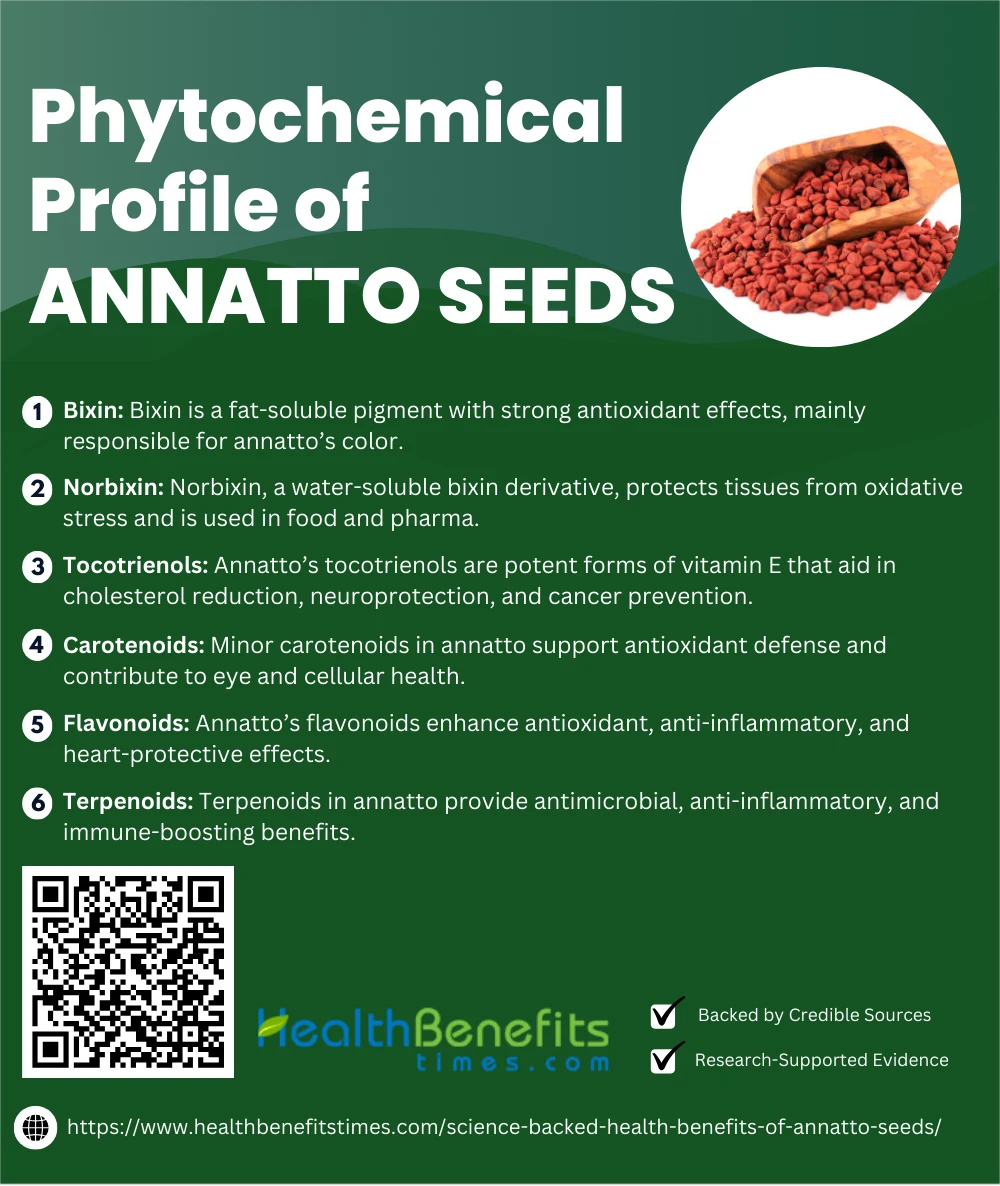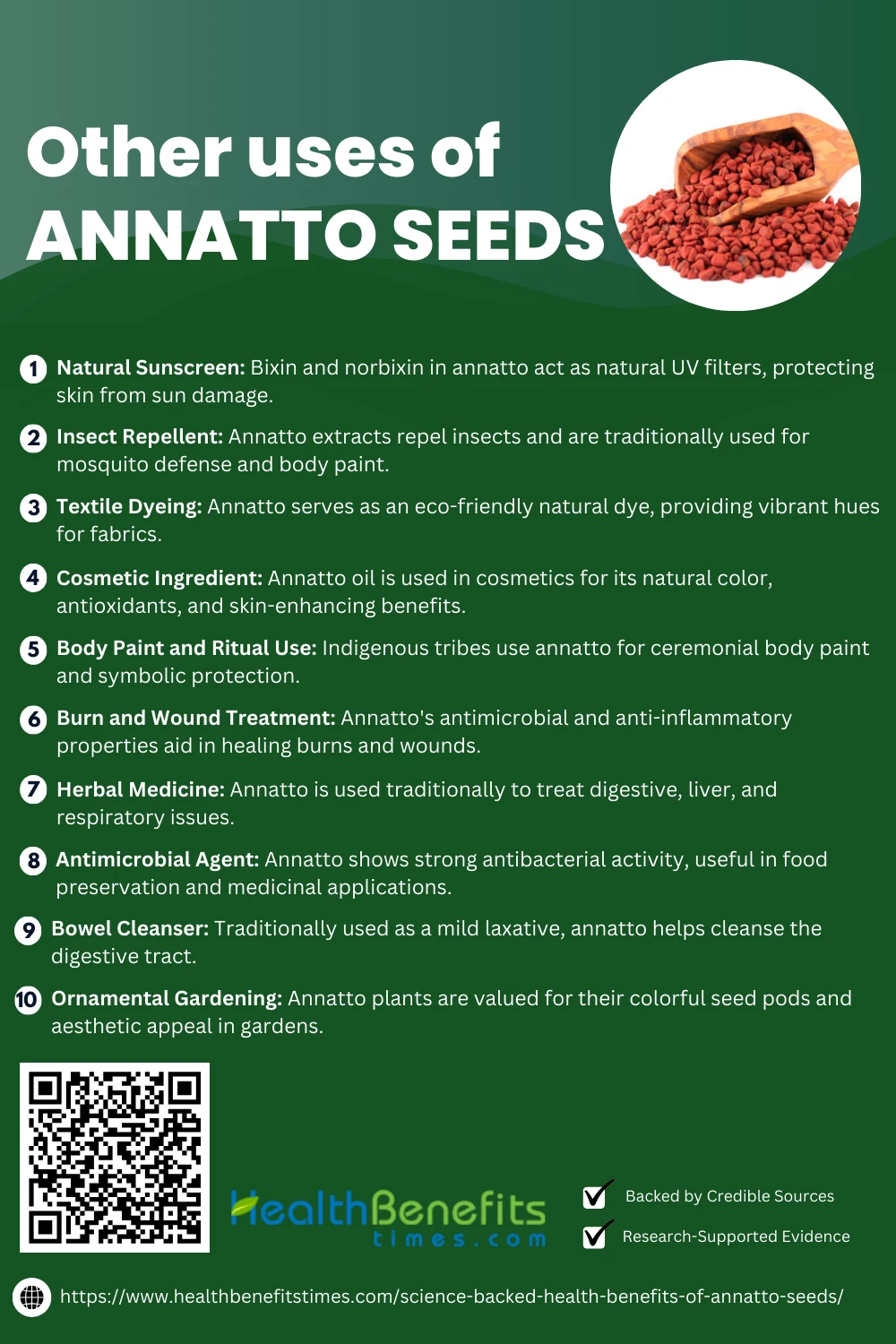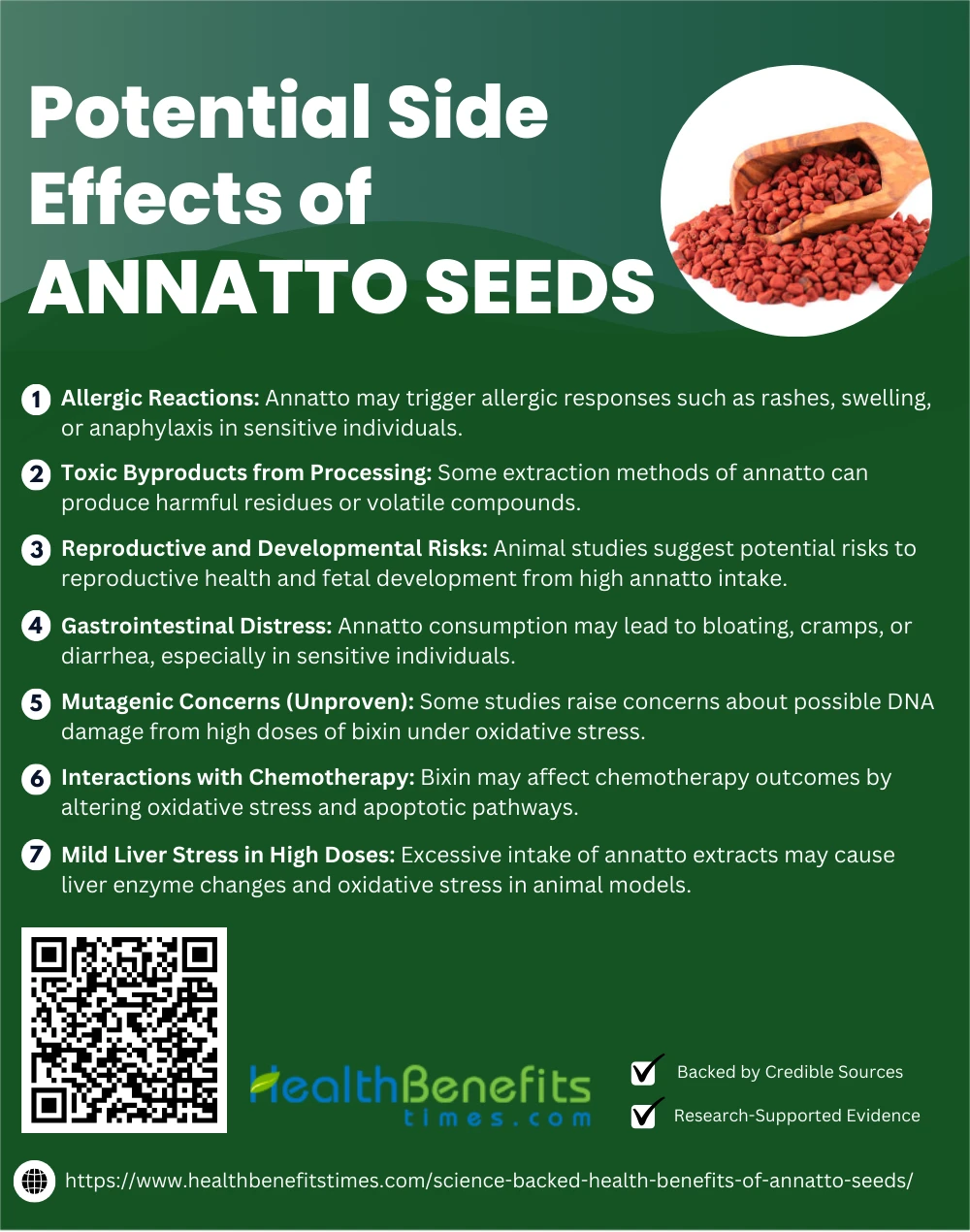- Annatto seeds come from the Bixa orellana tree and are widely used as a natural food coloring and traditional remedy.
- Backed by scientific studies, annatto seeds offer antioxidant, antimicrobial, and anti-inflammatory health benefits.
- Research highlights their potential in supporting heart health, wound healing, and digestive wellness.
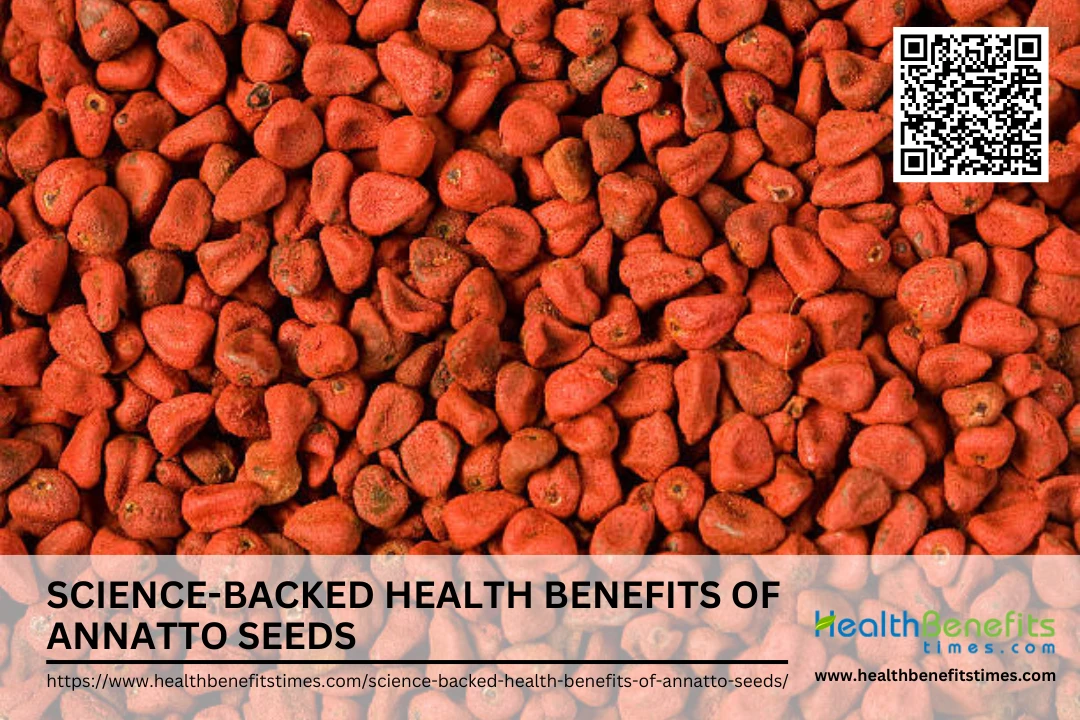 Annatto seeds are the reddish-orange seeds derived from the tropical shrub Bixa orellana, traditionally used as both a natural dye and a medicinal agent due to their rich bioactive composition. Growing scientific interest has spotlighted Annatto seeds as more than just a coloring agent, unveiling a wide spectrum of health-promoting properties. These seeds are rich in carotenoids like bixin and norbixin, along with a unique source of tocotrienols, a form of vitamin E with powerful antioxidant and anti-inflammatory properties. Studies have revealed their potential in reducing oxidative stress, supporting cardiovascular health, modulating inflammation, and even exhibiting anticancer activity. Furthermore, recent reviews have highlighted their bioefficacy in functional food development, nutraceuticals, and therapeutic applications, reinforcing their place in science-backed wellness strategies.
Annatto seeds are the reddish-orange seeds derived from the tropical shrub Bixa orellana, traditionally used as both a natural dye and a medicinal agent due to their rich bioactive composition. Growing scientific interest has spotlighted Annatto seeds as more than just a coloring agent, unveiling a wide spectrum of health-promoting properties. These seeds are rich in carotenoids like bixin and norbixin, along with a unique source of tocotrienols, a form of vitamin E with powerful antioxidant and anti-inflammatory properties. Studies have revealed their potential in reducing oxidative stress, supporting cardiovascular health, modulating inflammation, and even exhibiting anticancer activity. Furthermore, recent reviews have highlighted their bioefficacy in functional food development, nutraceuticals, and therapeutic applications, reinforcing their place in science-backed wellness strategies.
Phytochemical Profile of Annatto Seeds
Annatto seeds are rich in bioactive compounds, notably bixin, norbixin, and tocotrienols. These phytochemicals contribute to the seeds’ antioxidant, anti-inflammatory, and antimicrobial properties, making them valuable in natural medicine.
- Bixin
Bixin is a reddish-orange apocarotenoid pigment that constitutes up to 80% of the total carotenoids in annatto seeds. It is fat-soluble and primarily responsible for annatto’s coloring properties. Beyond aesthetics, bixin has been shown to exhibit antioxidant activity by scavenging free radicals and protecting lipid membranes from oxidative stress. - Norbixin
Norbixin is a water-soluble derivative of bixin formed through saponification. It retains strong antioxidant potential and has also shown promise in protecting against oxidative damage in biological tissues. Due to its solubility, norbixin is used in food and pharmaceuticals. Studies indicate that norbixin can inhibit lipid peroxidation and reduce oxidative markers. - Tocotrienols
Annatto seeds are unique among natural sources for containing delta- and gamma-tocotrienols, but no tocopherols. Tocotrienols are potent forms of vitamin E with superior antioxidant and anti-inflammatory properties. They help lower cholesterol, protect against neurodegeneration, and may inhibit cancer cell growth. Annatto-derived tocotrienols are highly bioavailable and widely studied for therapeutic applications. - Carotenoids
Besides bixin and norbixin, annatto contains other minor carotenoids that contribute to its antioxidant activity. Carotenoids help in neutralizing singlet oxygen and stabilizing free radicals, thus supporting eye health and cellular protection. The unique carotenoid profile of annatto makes it a promising ingredient in functional foods and natural health products. - Flavonoids
Though not as abundant as bixin, flavonoids are present in annatto seeds and leaves. These compounds offer additional antioxidant, anti-inflammatory, and antimicrobial effects. They enhance cellular resilience to stress and may contribute to annatto’s cardioprotective properties. Their synergy with other compounds like carotenoids enhances the overall health impact of the seed. - Terpenoids
Terpenoids in annatto contribute to its aroma and bioactivity. They possess antimicrobial and anti-inflammatory functions, and may also support immune modulation. Some terpenes interact with signaling pathways in cells, enhancing protective enzyme expression and inhibiting harmful inflammation cascades. These compounds expand annatto’s functional role in nutraceuticals and herbal medicine.
Key Health Benefits of Annatto Seeds
Annatto seeds offer a range of science-backed health benefits due to their potent antioxidants and phytochemicals. Research highlights their roles in supporting heart health, reducing inflammation, and promoting skin protection.
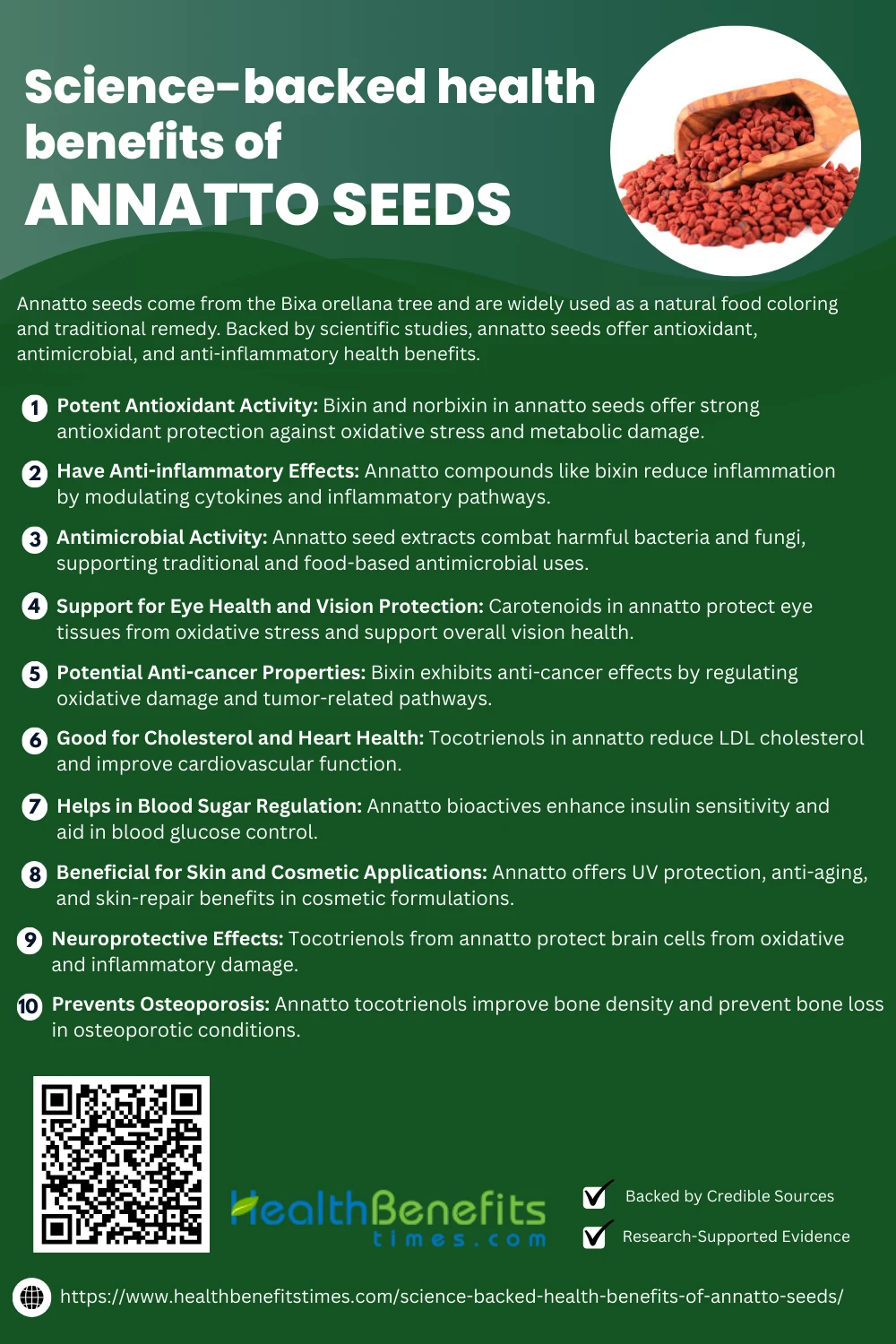 1. Potent Antioxidant Activity
1. Potent Antioxidant Activity
Annatto seeds are rich in bixin and norbixin, potent antioxidants that scavenge free radicals and protect against oxidative stress. Studies reveal high antioxidant activity in annatto seed extracts used in food preservation and pharmaceutical formulations. These extracts improve cellular antioxidant defenses in animal models and enhance insulin sensitivity. (1) (2) Additionally, bixin was shown to synergize with metformin for metabolic and oxidative protection. (3)
2. Have Anti-inflammatory Effects
Annatto seeds contain apocarotenoids like bixin that exhibit strong anti-inflammatory effects. Research confirms these compounds suppress inflammatory markers and cytokine production in various models. A 2024 study highlighted bixin’s potential to modulate inflammation in respiratory pathways. Other studies demonstrate its anti-steatotic action, bioactive regulation, and systemic inflammation suppression, particularly in high-fat diet-induced models of metabolic dysfunction. (4) (5) (5)
3. Antimicrobial Activity
Annatto seeds (Bixa orellana) exhibit notable antimicrobial properties attributed to their bioactive compounds, particularly bixin and norbixin. Research has shown that annatto seed extracts inhibit bacterial strains, including Staphylococcus aureus and Escherichia coli, supporting their traditional medicinal use Aluko & Adetuyi, 2024. A comprehensive review also confirms the antimicrobial efficiency of annatto-derived dyes against fungi and bacteria Barboza et al., 2022. (6) Additionally, Mandal et al. highlighted its potential as a natural therapeutic agent. In food systems, annatto has been used to inhibit microbial spoilage Pagnan et al., 2018. (7) Moreover, safety evaluations support its use in antimicrobial formulations EFSA Panel, 2016. (8)
4. Support for Eye Health and Vision Protection
Annatto seeds contain carotenoids such as bixin, which exhibit protective effects against retinal degeneration and oxidative stress, enhancing vision health. Studies have shown that annatto extracts prevent retinal damage under stress conditions Tsuruma et al., 2012. (9) Its antioxidant properties help maintain eye tissue integrity Fetian et al., 2024. (10) Annatto also complements lutein in supporting ocular health Ulbricht et al., 2012. (11) Further, Naik et al., 2016 emphasized its use in cosmeceuticals for vision protection. (12) Lastly, its bioactive compounds have demonstrated cellular protection in preclinical models Barboza et al., 2022. (6)
5. Potential Anti-cancer Properties
Annatto seeds are rich in bixin, an apocarotenoid with demonstrated anti-cancer properties through antioxidant and anti-inflammatory mechanisms Allen-Gipson, 2024. Studies show bixin inhibits oxidative damage and modulates pathways involved in tumor suppression. Bixin also shows promise in regulating cellular metabolism in obesity-related cancers. Furthermore, bixin’s interaction with e-cig-related inflammation implies its potential in reducing cancer risks. Additional studies support its multi-targeted anti-cancer potential Zamani et al., 2024. (5)
6. Good for Cholesterol and Heart Health
Annatto seeds are beneficial for cardiovascular health due to their high tocotrienol content, particularly delta- and gamma-tocotrienols, which help reduce LDL cholesterol and arterial plaque formation Zamani et al., 2024. (5) Studies indicate that tocotrienols from annatto oil significantly lower plasma cholesterol while enhancing endothelial function. Bixin also exhibits antioxidant properties that support vascular health Pagnan et al., 2018. (7) Clinical reviews highlight its lipid-lowering effects Ulbricht et al., 2012. (11) Moreover, annatto extract is suggested to combat oxidative stress-induced cardiac dysfunction Choudhury et al., 2023. (13) Its regular dietary inclusion may thus aid in maintaining healthy cholesterol levels EFSA Panel, 2016. (8)
7. Helps in Blood Sugar Regulation
Annatto seeds contain bioactive compounds like bixin and norbixin that exhibit hypoglycemic effects, making them beneficial in regulating blood glucose levels. Clinical and animal studies suggest they enhance insulin sensitivity and modulate carbohydrate metabolism. A study highlighted their impact on pancreatic β-cells’ regeneration, while others confirmed anti-diabetic properties through antioxidative mechanisms. (14) (15) Additional evidence supports their anti-inflammatory, hepatic-protective, and anti-obesity actions, contributing to better glucose regulation. (16) (17) (18)
8. Beneficial for Skin and Cosmetic Applications
Annatto seeds are increasingly valued in cosmetics due to their antioxidant-rich carotenoids, particularly bixin. These compounds offer UV protection, anti-aging, and pigmentation properties. Researchers found annatto-based emulsions enhance skin barrier function and repair photodamage. (14) (19) Annatto oils are also effective in topical formulations, showing strong adherence and skin hydration. (16) Additionally, studies show their role in nanoparticle delivery and as natural colorants in skin-care. (17) (15)
9. Neuroprotective Effects
Annatto seeds, rich in tocotrienols, show promising neuroprotective potential by reducing oxidative stress and neuroinflammation. Tocotrienols from annatto were found to safeguard neurons by modulating lipid peroxidation and mitochondrial integrity. (5) Other studies highlight their role in inhibiting neurodegeneration, enhancing memory, and protecting against ischemic injury, with additional evidence showing cell-signaling benefits. (20)
10. Prevents Osteoporosis
Annatto-derived tocotrienols prevent osteoporosis by enhancing bone density, reducing resorption, and regulating calcium metabolism. Studies show tocotrienols from annatto improve bone microstructure in osteopenic models. (21) These compounds also stimulate osteoblast activity, reduce oxidative bone damage, and enhance bone mineralization. (22) (23) (24) Annatto supplementation was shown to prevent testosterone-deficiency-induced bone loss in rats. (25)
How to include Annatto Seeds in your daily diet
Annatto seeds can be easily included in your daily diet as a natural food coloring, spice, or extract. They enhance flavor, add color, and offer nutritional and medicinal benefits.
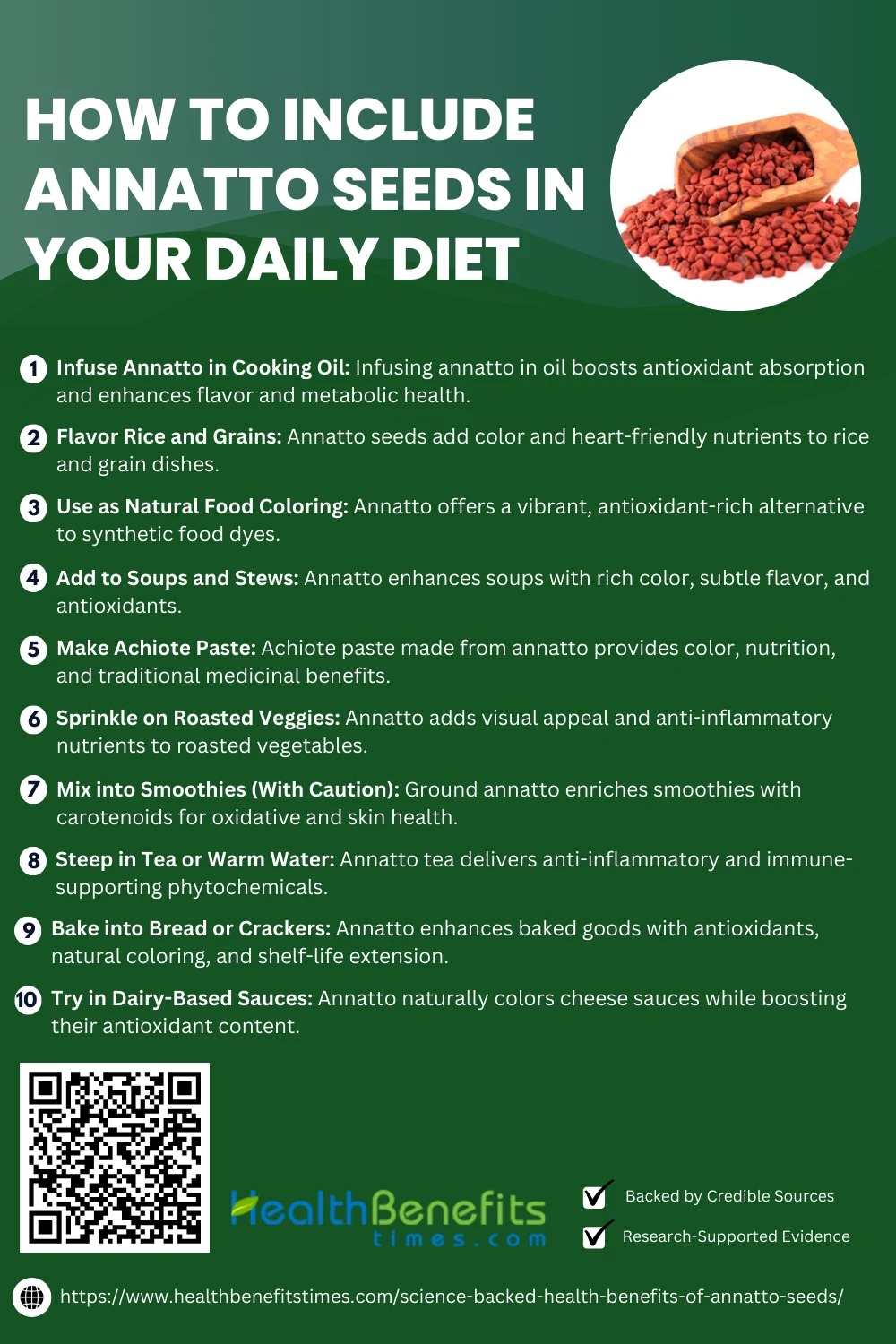 1. Infuse Annatto in Cooking Oil
1. Infuse Annatto in Cooking Oil
Infusing annatto seeds in oil releases bixin, a carotenoid with strong antioxidant and anti-inflammatory properties. This method enhances bioavailability, as seen in studies highlighting bixin’s cellular antioxidant defense, lipid protection, and anti-obesity roles. (26) (27) (3) Annatto oil also supports glucose modulation, UV shielding, and wound healing. (14) (28) (2) Its culinary use improves flavor profile and supports metabolic regulation. (1) (29)
2. Flavor Rice and Grains
Annatto seeds enhance rice and grains with color and antioxidants. Bixin-rich infusions in grains contribute to natural food preservation, while their tocotrienols support cardiovascular health. (30) (31) Researchers also confirm its benefits in grain-based functional foods. (32)
3. Use as Natural Food Coloring
Incorporating annatto seeds as a natural food coloring is an excellent way to enhance your dishes while avoiding synthetic additives. These seeds, rich in carotenoids like bixin, provide a vibrant hue and offer antioxidant properties beneficial to health. (33) Used traditionally in Latin American cuisine, annatto is known for its culinary versatility and therapeutic potential. (34) It’s widely adopted in food formulations due to its stability under cooking conditions. (35) Beyond color, it may reduce inflammation and support cardiovascular health. (36) Its usage extends to traditional preparations like rice, cheese, and margarine. (37) Annatto extract is also gaining popularity in clean-label products due to growing health-conscious consumer trends. (38) Studies suggest it has minimal allergenic risk, making it a safe alternative. (39) When used in cooking oils, annatto offers both flavor and functional health benefits, and is applicable across baking, snacks, and dairy industries. (40) (41)
4. Add to Soups and Stews
Adding annatto seeds to soups and stews not only enhances color but also contributes antioxidant-rich flavor compounds. (42) Traditionally used in Filipino and Latin American cuisines, annatto oil imparts a subtle peppery-nutty taste while boosting nutrition. (34) When sautéed with aromatics, it adds depth and can replace artificial colors without compromising flavor or health. (43)
5. Make Achiote Paste
Creating achiote paste using annatto seeds not only enhances flavor but offers significant nutritional value. The paste is rich in carotenoids like bixin, known for antioxidant and anti-inflammatory properties Rojo De La Vega et al., 2017. (14) It supports immune health Miguel et al., 2024, and its compounds may protect against oxidative damage Raddatz-Mota et al., 2017. (44) (40) Traditional uses have shown anti-microbial benefits Ayora-Diaz, 2012 and skin protection potential De La Vega et al., 2017. (45) (14) Culinary experts also highlight its natural pigment and preservative qualities Ravindran et al., 2012, while sustainable processing boosts its eco-value Patino et al., 2023. (42) (46) This traditional staple bridges modern nutrition and ancestral knowledge Cevallos et al., 2021 and remains a powerful addition to global cuisines Upadhyay et al., 2023. (47) (48)
6. Sprinkle on Roasted Veggies
Sprinkling annatto seeds on roasted vegetables adds not only color and flavor but nutritional value. Their antioxidant compounds, especially bixin, protect against cellular damage Upadhyay et al., 2023. (47) They also offer natural anti-inflammatory support Maharudra et al., 2020 and blend beautifully with vegetables rich in fiber and phytonutrients PSGCAS, 2023. (49) (50)
7. Mix into Smoothies (With Caution)
Annatto seeds can be ground and added to smoothies, enriching them with potent antioxidants like bixin and norbixin. These carotenoids enhance oxidative protection, support cellular health, and improve lipid metabolism. (51) (52) Their natural pigments also aid skin health, and support immune defense. (53) (54) Studies confirm anti-inflammatory synergy, cholesterol balance, and liver protection with daily intake. (55) (56) (57)
8. Steep in Tea or Warm Water
Steeping annatto seeds in warm water releases bioactive compounds like tocotrienols and carotenoids with strong anti-inflammatory and antioxidant effects. Traditionally used in herbal infusions, annatto tea is shown to help with immune support, reduce inflammation, and improve skin vitality. (55) (58)
9. Bake into Bread or Crackers
Incorporating annatto seeds into bread and crackers infuses them with bixin and norbixin, natural pigments with powerful antioxidant effects. (54) Their inclusion enhances shelf-life and functional food value. Studies show improved sensory attributes and reduced lipid oxidation. (59) (60) Research also supports their bioactive roles, nutritional synergy, anti-microbial function, color retention in baking, and enhanced food technology applications. (47) (50) (55) (61) (62)
10. Try in Dairy-Based Sauces
Annatto seeds are traditionally used to color and flavor cheese sauces like cheddar and gouda due to their natural pigment bixin. (63) These seeds enhance antioxidant levels in dairy-based recipes, supporting food stability and nutritional enrichment. (64) (65)
Other uses of Annatto Seeds
Beyond culinary use, annatto seeds serve in traditional medicine, cosmetics, and natural dye production. Their antimicrobial and antioxidant properties make them valuable in skincare, textile coloring, and herbal remedies.
Annatto seeds contain bixin and norbixin, carotenoids that act as natural UV filters. These compounds help protect skin by absorbing and scattering ultraviolet rays, reducing photodamage. Research shows bixin’s efficacy in enhancing skin barrier function, boosting sun protection factors, and functioning as active agents in sunscreen formulations. (14) (66) (67)
2. Insect Repellent
Annatto seeds exhibit strong insect repellent properties due to their high content of bixin and norbixin, which deter mosquitoes and other pests. Traditional Amazonian tribes have long used Bixa orellana extracts for body paint and insect defense. (68) Studies confirm annatto’s repellency against Aedes aegypti, and novel applications include annatto-based nanoformulations for pest control.
3. Textile Dyeing
Annatto seeds serve as a sustainable dyeing agent for natural fibers like cotton, silk, and wool, offering vibrant yellow-orange hues from their bixin pigment. Their eco-friendly profile makes them suitable for green textile industries. (69) Studies show effective silk and polyester dyeing using annatto extracts and support its viability as a natural alternative to synthetic dyes in fashion industries. (70) (71)
4. Cosmetic Ingredient
Annatto seeds are increasingly valued in cosmetics for their antioxidant-rich extracts that enhance skin tone and UV protection. Used in formulations like lipsticks and creams, annatto oil adds natural pigmentation and emollient properties. (72) Traditional applications underscore its photoprotective function, while modern dermatology confirms its bioactivity in skincare products. (35)
5. Body Paint and Ritual Use
For centuries, annatto seeds have served as ritualistic body paint among Indigenous communities. Tribes like the Kayapo use annatto for protection and symbolic expression during ceremonies. The Ka’apor people apply it daily as insect repellent and spiritual marker. (73) Its vivid pigment links annatto to ancient ceremonial artistry.
6. Burn and Wound Treatment
Annatto seeds demonstrate notable wound-healing potential due to their antimicrobial and anti-inflammatory properties. Traditional medicine has used Bixa orellana for treating skin injuries and burns, supported by evidence of cicatrizing effects in clinical studies. (6) (74) These findings validate its use in phytotherapeutic formulations for topical applications.
7. Herbal Medicine
Beyond coloring, annatto seeds are deeply rooted in traditional herbal medicine for treating digestive, hepatic, and respiratory disorders. Phytochemicals in annatto exhibit antioxidant and antibacterial effects, supporting its folkloric applications and potential pharmaceutical development. (70)
8. Antimicrobial Agent
Annatto seeds exhibit significant antimicrobial properties due to their rich content of bixin and norbixin, which inhibit the growth of various bacterial strains. Studies have shown their efficacy against Staphylococcus aureus and Escherichia coli, making them promising natural preservatives in food and pharmaceuticals. One such study confirmed annatto’s inhibitory effects on foodborne pathogens. Additional evidence supports its application in antimicrobial formulations, particularly in developing countries where traditional medicine is prevalent. (70) These findings are further backed by research on annatto’s phytochemical profile, demonstrating potent antibacterial activity. (35)
9. Bowel Cleanser
Traditionally used across South America, annatto seeds are valued for their mild laxative and cleansing effects on the digestive tract. Ethnobotanical records show annatto’s use in relieving constipation and purging toxins from the intestines, especially postpartum. (75) Its effectiveness is linked to bixin’s antioxidant and digestive-regulating properties. (70) In modern phytotherapy, annatto is also cited as a complementary treatment in bowel detox regimens. (35)
10. Ornamental Gardening
Annatto (Bixa orellana) is admired for its vibrant red seed pods and lush foliage, making it a popular choice in ornamental landscaping. The plant’s aesthetic appeal contributes to its cultivation in tropical gardens. (76) It is also appreciated for its dual value as a natural dye source and decorative species.
Potential Side Effects of Annatto Seeds
While annatto seeds offer health benefits, they may cause side effects in some individuals, including allergic reactions, gastrointestinal discomfort, or interactions with medications. Caution is advised with excessive or unsupervised use.
Annatto seeds have been implicated in causing allergic responses, including urticaria and angioedema, particularly in sensitive individuals. Documented cases show immune-mediated hypersensitivity to annatto extract in both children and adults. (77) Furthermore, annatto-induced anaphylaxis was observed in patients with food allergies. Its use in processed foods warrants precaution.
2. Toxic Byproducts from Processing
Processing annatto seeds can release harmful volatile compounds depending on the extraction method. Sodium hydroxide-based extraction was found to reduce toxic residues, unlike solvent-based methods. (78) Toxic solvent residues during dye extraction are also a concern. (79) Industrial use must consider health risks from such byproducts. (80)
3. Reproductive and Developmental Risks
While annatto seeds are widely used as natural colorants, emerging evidence raises concerns over their potential reproductive and developmental toxicity. Experimental studies have linked annatto extract exposure to disrupted embryonic growth and testicular oxidative stress in animals. (81) Additionally, EFSA evaluations noted the presence of DNA damage in rodent gastric tissues following high annatto intake. (8) Supporting these findings, a systemic toxicology review highlighted concerns over genotoxic components in bixin and nor-bixin, the key pigments in annatto. (82)
4. Gastrointestinal Distress
Annatto seeds, though popular in traditional diets, may induce gastrointestinal discomfort such as bloating and cramping, particularly in sensitive individuals. (50) In poultry studies, ingestion of annatto extract increased gut stress biomarkers, suggesting digestive strain. (81) Furthermore, hypersensitivity case reports confirm abdominal pain and diarrhea linked to annatto-laced food products. (83)
5. Mutagenic Concerns (Unhttps://www.annallergy.org/article/S1081-1206(21)00518-4/abstractproven)
Emerging studies suggest that compounds in annatto seeds—primarily bixin—may possess mutagenic potential under certain metabolic or oxidative stress conditions. One such concern was observed in a rat model showing DNA damage linked to high-dose bixin intake Protective effect of bixin on cisplatin-induced genotoxicity. (84) Furthermore, a broader toxicological review on annatto additives reported potential chromosomal aberrations in mammalian cells Food and Chemical Toxicology review. (84) Lastly, cell culture studies on PC12 neural cells also supported bixin’s DNA-damaging effects under oxidative conditions Modulation of free radical generation by bixin. (85)
6. Interactions with Chemotherapy
Annatto seeds contain bixin, which may interact with chemotherapeutic drugs by modulating oxidative stress pathways. For instance, co-treatment with bixin altered cisplatin genotoxicity in PC12 cells Protective effect of bixin on cisplatin-induced genotoxicity. (84) Additionally, its influence on apoptotic pathways was evident in hepatocellular carcinoma cells Bixin triggers apoptosis of Hep3B cells. (86) A third study found that bixin enhanced or inhibited drug efficacy depending on dosage and cell type Antiproliferative activity of Bixa orellana carotenoids. (87)
7. Mild Liver Stress in High Doses
High doses of annatto seed extract—especially bixin-rich derivatives—have been associated with liver enzyme alterations and hepatocellular changes in rodent studies. A WHO evaluation found liver weight increases and mild necrosis in test animals at elevated doses. Similarly, a study in mice on bixin’s role in fatty liver disease noted dose-dependent liver impacts. (88) Moreover, subchronic exposure led to oxidative stress indicators in hepatic tissues, suggesting metabolic strain. (89)
Conclusion
Annatto seeds, derived from the Bixa orellana plant, offer a wealth of health benefits supported by scientific research. Rich in antioxidants like bixin and norbixin, they contribute to reduced inflammation, improved heart health, antimicrobial protection, and enhanced skin and eye wellness. Their versatility in cooking, traditional remedies, and even cosmetics adds to their appeal. However, while generally considered safe, caution is necessary due to potential allergic reactions or adverse effects in sensitive individuals. As research continues to uncover more about their therapeutic potential, incorporating annatto seeds into a balanced diet can be a flavorful and health-promoting choice when used responsibly.


